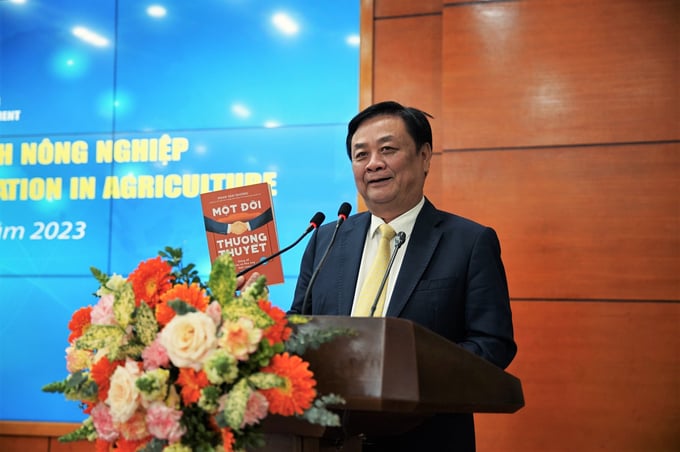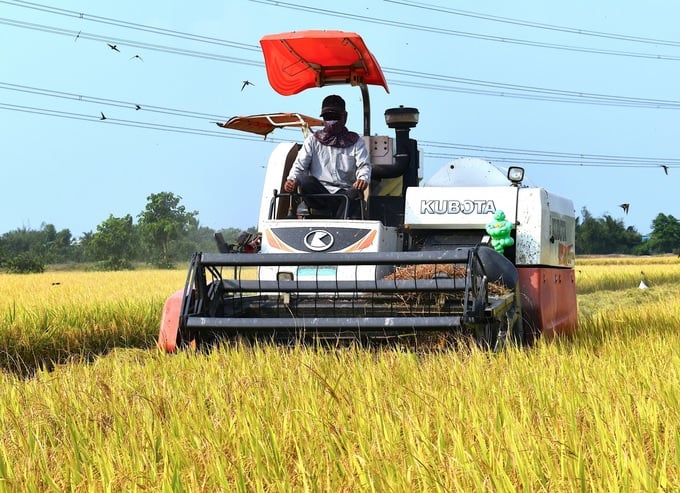June 14, 2025 | 01:35 GMT +7
June 14, 2025 | 01:35 GMT +7
Hotline: 0913.378.918
June 14, 2025 | 01:35 GMT +7
Hotline: 0913.378.918

“International cooperation plays an increasingly important role in the context that globalization and integration become an inevitable trend” - Minister of Agriculture and Rural Development Le Minh Hoan. Photo: Linh Linh.
On February 10, the Ministry of Agriculture and Rural Development (MARD) held a Conference on International Cooperation in Agriculture to share recent results and discuss in order to enhance the effectiveness of international cooperation and international economic integration in the near future.
Speaking at the conference, Minister of Agriculture and Rural Development Le Minh Hoan emphasized the increasingly important role of international cooperation in the context that globalization and integration become an inevitable trend.
Vietnam has joined and is implementing 16 Free Trade Agreements (FTAs), and currently continues to negotiate new Free Trade Agreements with Israel and Canada. This means Vietnam has signed FTAs with all key agro-forestry-fishery (AFF) export markets. This is an important factor to help businesses have a competitive advantage in the world market.
Market opening works have made remarkable progress such as opening the market for durian, sweet potato and bird's nest to China, pomelo to the USA, processed chicken to Japan, pomelo and lemon to New Zealand.
The agricultural sector has also been actively promoting the attraction of foreign direct investment (FDI) and official development aid (ODA), exchanging experiences in construction and technology transfer. This thus contributes to speeding up the process of approaching advanced science, modern economic leadership and management.
“International cooperation always needs to be one step ahead to be ready to deal with all challenges and take advantage of every opportunity with creative methods to effectively serve the policy. of the Party and State, towards the goal of Ecological Agriculture - Vibrant Countryside - Innovative Farmers,” said Minister Le Minh Hoan.
Also at the conference, Mr. Nguyen Do Anh Tuan, Director General of International Cooperation Department, MARD, presented the Draft “Strategy for International Cooperation in Agriculture and Rural Development until 2030”.
The strategy divides into three main groups of tasks and solutions, which include proactively integrating worldwide, bringing into play the best advantages of Vietnam's agricultural sector; strengthening partnerships, building a good image of agriculture, farmers and rural areas in Vietnam; optimizing the mobilization and use of external resources for Vietnam's agriculture and rural development sector.
Regarding implementation, Mr. Nguyen Do Anh Tuan made a number of proposals. Firstly, the agricultural sector needs to promote communication and raise awareness about international cooperation while effectively implementing signed agreements related to the industry.
Secondly, strengthen regular monitoring and evaluation to improve the effectiveness of the implementation of the strategy, and at the same time review and adjust the strategy to suit each period and practical conditions.
Thirdly, develop the Regulation on Foreign Affairs to unify the focal points of international cooperation and management.
Fourthly, improve the quality of human resources, promote innovation; train and appoint qualified civil servants to ensure quality, competence and ethical responsibility; train staff in negotiation skills, legal, market analysis, agro-ecological management; implement the mechanism of recruitment and use of suitable talents.
Fifthly, allocate funds from the state budget, coordinate with international support sources; ensure synchronous and modern equipment for international cooperation agencies in the industry.

Agriculture is an area where Vietnam has a voice and reputation in the world.
Contributing ideas to further develop the orientation of international cooperation in the agricultural sector, Ms. Nguyen Minh Hang, a representative of the Ministry of Foreign Affairs said that the agricultural sector could focus on building a strategy for foreign affairs. “The world is going through a period of profound transformation. In 2023 there will be positive signals with "winds down", China's market opening, consumer trend recovering at a multi-speed, which will create opportunities for Vietnam’s agricultural sector to reach out more strongly to consumers and diversify the markets.”
In recent years, the MARD has actively participated in important international forums, creating the image of a reliable and responsible partner to the international community. Vietnam has been selected by the United Nations to host the Global Food System Forum in April this year. The World Economic Forum has also selected Vietnam as one of the first three countries to pilot the Food Innovation Hub.
Translated by Samuel Pham

(VAN) In Tien Giang, a high-tech shrimp farm has developed a distinctive energy-saving farming model that has yielded promising results.
![Turning wind and rain into action: [3] 300.000 farmers benefit from agro-climatic bulletins](https://t.ex-cdn.com/nongnghiepmoitruong.vn/608w/files/news/2025/06/12/e5a48259d6a262fc3bb3-nongnghiep-125122.jpg)
(VAN) The agro-climatic bulletin has become a valuable tool for farmers in the Mekong Delta. After more than five years of implementation, the initiative is gradually being expanded nationwide.
![Turning wind and rain into action: [2] Providing forecasts to the people](https://t.ex-cdn.com/nongnghiepmoitruong.vn/608w/files/news/2025/06/12/e5a48259d6a262fc3bb3-nongnghiep-103927.jpg)
(VAN) In addition to improving the quality of hydrometeorological forecasts, putting forecast bulletins into practical use is crucial for production and disaster prevention.

(VAN) Blue carbon is receiving attention for its rapid absorption capacity and vast potential. It represents a promising nature-based solution to respond to climate change.
/2025/06/11/3507-1-161904_583.jpg)
(VAN) Seagrass beds and coral reefs serve as 'cradles' that nurture life in the ocean depths, creating rich aquatic resources in Vietnamese waters.
![Turning wind and rain into action: [1] Forecasting for farmers](https://t.ex-cdn.com/nongnghiepmoitruong.vn/608w/files/news/2025/06/11/e5a48259d6a262fc3bb3-nongnghiep-111919.jpg)
(VAN) Weather is no longer just a matter of fate. Forecasts have now become an essential companion for farmers in every crop season.
/2025/06/10/2501-3-082025_983.jpg)
(VAN) Mr. Le Hoang Minh, Head of Vinamilk's Net Zero project, recently shared insights on the integration of production, energy, and technology in Vinamilk’s green transition journey.